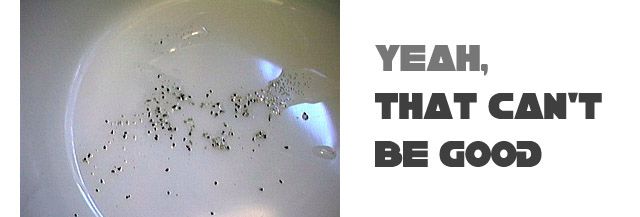We recently had a reader write us with a question about the black particles that are often found in water purified by Brita filters. Here is her letter (you can find our response below it):
I’m curious to know if you have done any testing regarding the black particles that are often found in the post filtered water of the Brita pitcher system.
I’ve heard several horror stories of the effect of the Brita filtered water on the digestive system – luckily I’ve not experienced that. However after I let a glass of filtered water sit for several hours, get to room temperature, I find very small sediment like particles in the bottom of the glass. Its unnerving to say the least and I’m concerned there may be health implication.
When visiting the Brita site they appear to feel this is normal… “Occasionally you may find small black particles escape from the cartridge. These are fragments of carbon due to possible carbon abrasion during transport. This can also lead to a slight discoloration for the first two fillings (which should not be consumed). This is completely normal and does not affect the performance of the cartridge. The contents of the cartridge are all food grade quality and completely harmless.
Thorough soaking, shaking the cartridge well under water and flushing the cartridge (as mentioned in the instructions for use) will encourage loose carbon particles to be released at this stage and help to eliminate further carbon release during use.”
Has any of your testing looked into this?
Unfortunately, we don’t have much information on this phenomenon. It’s worth noting that in general we recommend PUR products over those of Brita because of overall purification quality (the independent consumer review organization NSF rates PUR slightly higher. That said, in our comments on Brita, we have not discussed the “black particle phenomenon” and we can say from personal experience that we have both observed this in Brita filters).
There are, however, a few things to note about it.
1. The black particles are carbon based and should be completely harmless. Brita has actually made a comment on this as the reader mentioned and they have made efforts to relay that these particles are completely harmless. What’s more, there does not seem to be any data from NSF or other testing agencies that would suggest that there may be a health risk posed by these particles.
2. These particles can arrive even with new, properly functioning filters. Brita would have you believe that the particles are the result of a poorly maintained or expired filter. This may not always be the case. There is plenty of testimony from people who have had problems with these black particles despite the fact that their filters are well maintained or in some cases completely new.
3. Whether the particles are harmless or not, who wants to be drinking them? While it may be true that they are completely safe to drink, why do you have to bother with them in the first place? Brita does not make the only water filters on the market and there are plenty of alternative options. It seems clear that this is an ongoing problem with brita filters and it might have to do with a fundamental design flaw of their filters. They don’t seem particularly concerned about addressing it (apart from including it in the FAQ on their website). Our advice would be to simply use a different filter.







{ 8 comments… add one }